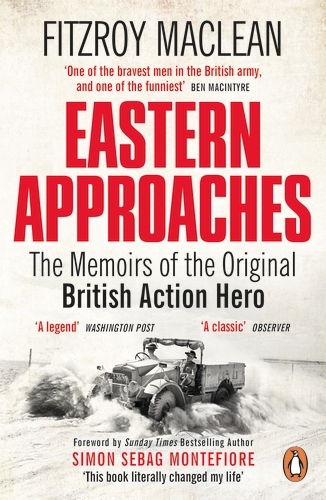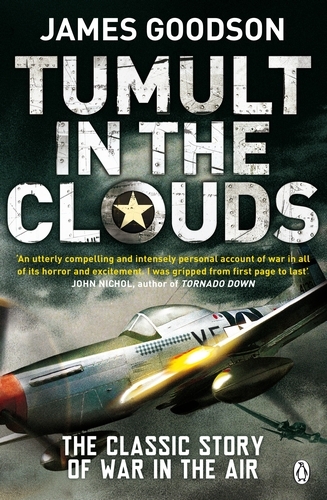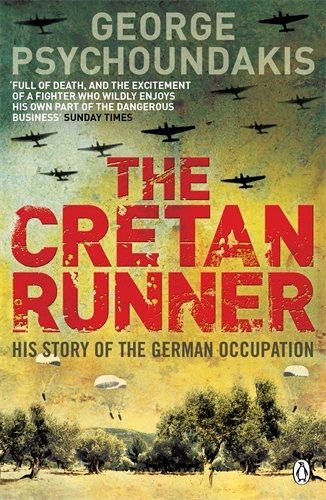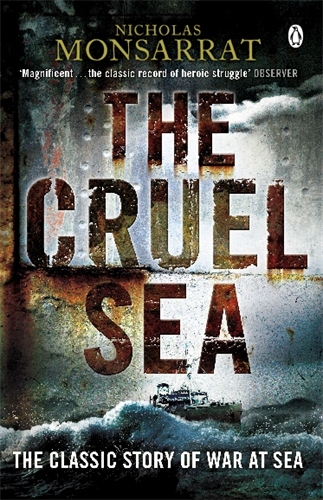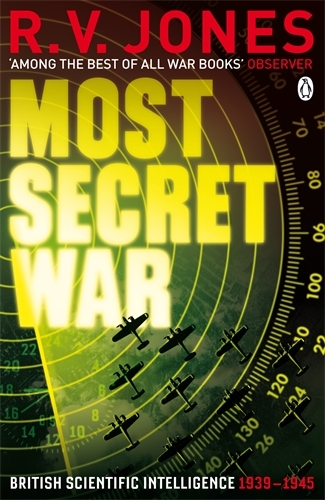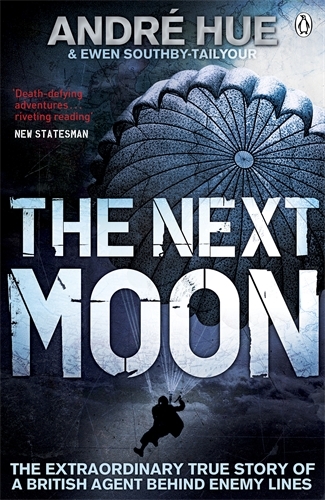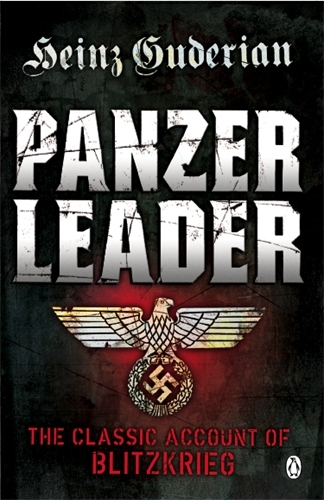Penguin World War II Collection
7 books in this series
Eastern Approaches
Posted to Moscow as a young diplomat before the Second World War, Fitzroy Maclean travelled widely, with or without permission, in some of the wildest and remotest parts of the Soviet Union, then virtually closed to foreigners. In 1942 he fought as a founder member of the SAS in North Africa. There Maclean specialised in hair-raising commando raids behind enemy lines, including the daring and outrageous kidnapping of the German Consul in Axis-controlled Iraq. In 1943 he parachuted into German-occupied Yugoslavia as Winston Churchill's personal representative to Josip Broz Tito and remained there until 1945, all enemy attempts to capture him proving unsuccessful.
Eastern Approaches is Maclean's classic, gripping account of the sybaritic delights of diplomatic life, the thrill of remote travel in the then-forbidden zones of Central Asia, and the violence and adventure of world-changing tours in North Africa and Yugoslavia. Maclean is the original British action hero and this is blistering reading.
Eastern Approaches is Maclean's classic, gripping account of the sybaritic delights of diplomatic life, the thrill of remote travel in the then-forbidden zones of Central Asia, and the violence and adventure of world-changing tours in North Africa and Yugoslavia. Maclean is the original British action hero and this is blistering reading.
Tumult in the Clouds
Anglo-American James Goodson's war began on Sept 3rd 1939, when the SS Athenia was torpedoed and sank off the Hebrides. Surviving the sinking and distinguishing himself rescuing survivors, Goodson immediately signed on with the RAF. He was an American, but he wanted to fight.
Goodson flew Spitfires for the RAF before later joining his countrymen with the Fourth Fighter Group to get behind the controls of Thunderbolts and Mustangs where he became known as 'King of the Strafers'.
Chock full of breathtaking descriptions of aerial dogfights as well as the stories of others of the heroic 'few', Tumult in the Clouds is the ultimate story of War in the air, told by the one of the Second World War's outstanding fighter pilots.
Goodson flew Spitfires for the RAF before later joining his countrymen with the Fourth Fighter Group to get behind the controls of Thunderbolts and Mustangs where he became known as 'King of the Strafers'.
Chock full of breathtaking descriptions of aerial dogfights as well as the stories of others of the heroic 'few', Tumult in the Clouds is the ultimate story of War in the air, told by the one of the Second World War's outstanding fighter pilots.
The Cretan Runner
George Psychoundakis was a young shepherd boy who knew the island of Crete intimately when the Nazis invaded by air in 1941. He immediately joined the resistance and took on the crucial job of war-time runner.
It was not only the toughest but the most dangerous job of all. It involved immense journeys carrying vital messages, smuggling arms and explosives and guiding Allied soldiers, agents and commandos through heavily garrisoned territory. And George did not escape capture and torture on his many forays.
This brilliant account of George's activities across mountainous terrain, come blazing summer or freezing winter, is a gripping story of bravery against impossible odds.
It was not only the toughest but the most dangerous job of all. It involved immense journeys carrying vital messages, smuggling arms and explosives and guiding Allied soldiers, agents and commandos through heavily garrisoned territory. And George did not escape capture and torture on his many forays.
This brilliant account of George's activities across mountainous terrain, come blazing summer or freezing winter, is a gripping story of bravery against impossible odds.
The Cruel Sea
Based on the author's own vivid experiences, The Cruel Sea is the nail-biting story of the crew of HMS Compass Rose, a corvette assigned to protect convoys in World War Two.
Darting back and forth across the icy North Atlantic, Compass Rose played a deadly cat and mouse game with packs of German U-boats lying in wait beneath the ocean waves.
Packed with tension and vivid descriptions of agonizing U-boat hunts, this tale of the most bitter and chilling campaign of the war tells of ordinary, heroic men who had to face a brutal menace which would strike without warning from the deep . . .
Darting back and forth across the icy North Atlantic, Compass Rose played a deadly cat and mouse game with packs of German U-boats lying in wait beneath the ocean waves.
Packed with tension and vivid descriptions of agonizing U-boat hunts, this tale of the most bitter and chilling campaign of the war tells of ordinary, heroic men who had to face a brutal menace which would strike without warning from the deep . . .
Most Secret War
Reginald Jones was nothing less than a genius. And his appointment to the Intelligence Section of Britain's Air Ministry in 1939 led to some of the most astonishing scientific and technological breakthroughs of the Second World War.
In Most Secret War he details how Britain stealthily stole the war from under the Germans' noses by outsmarting their intelligence at every turn. He tells of the 'battle of the beams'; detecting and defeating flying bombs; using chaff to confuse radar; and many other ingenious ideas and devices.
Jones was the man with the plan to save Britain and his story makes for riveting reading.
In Most Secret War he details how Britain stealthily stole the war from under the Germans' noses by outsmarting their intelligence at every turn. He tells of the 'battle of the beams'; detecting and defeating flying bombs; using chaff to confuse radar; and many other ingenious ideas and devices.
Jones was the man with the plan to save Britain and his story makes for riveting reading.
The Next Moon
Andre Hue was a daredevil. By the age of twenty the Anglo-Frenchman had survived shipwreck and years undercover in France, sabotaging German supply lines. Returning to Britain, he was recruited by SOE to parachute behind enemy lines on 5 June 1944, to unite resistance forces in Brittany and paralyse local German troops during the Allied invasion.
Though Hue's mission was fraught with difficulty - he missed his landing site, his secret base camp became the site of a pitch battle and a band of Cossacks tried to hunt him down - he knew that thousands of lives depended on his success or failure . . .
Though Hue's mission was fraught with difficulty - he missed his landing site, his secret base camp became the site of a pitch battle and a band of Cossacks tried to hunt him down - he knew that thousands of lives depended on his success or failure . . .
Panzer Leader
Heinz Guderian - master of the Blitzkrieg and father of modern tank warfare - commanded the German XIX Army Corps as it rampaged across Poland in 1939.
Personally leading the devastating attack which traversed the Ardennes Forest and broke through French lines, he was at the forefront of the race to the Channel coast. Only Hitler's personal command to halt prevented Guderian's tanks and troops turning Dunkirk into an Allied bloodbath.
Later commanding Panzergruppe 2 in Operation Barbarossa, Guderian's armoured spearhead took Smolensk after fierce fighting and was poised to launch the final assault on Moscow when he was ordered south to Kiev. In the battle that followed, he helped encircle and capture over 600,000 Soviet troops after days of combat in the most terrible conditions.
Panzer Leader is a searing firsthand account of the most effective fighting force in modern history by the man who commanded it.
Personally leading the devastating attack which traversed the Ardennes Forest and broke through French lines, he was at the forefront of the race to the Channel coast. Only Hitler's personal command to halt prevented Guderian's tanks and troops turning Dunkirk into an Allied bloodbath.
Later commanding Panzergruppe 2 in Operation Barbarossa, Guderian's armoured spearhead took Smolensk after fierce fighting and was poised to launch the final assault on Moscow when he was ordered south to Kiev. In the battle that followed, he helped encircle and capture over 600,000 Soviet troops after days of combat in the most terrible conditions.
Panzer Leader is a searing firsthand account of the most effective fighting force in modern history by the man who commanded it.
